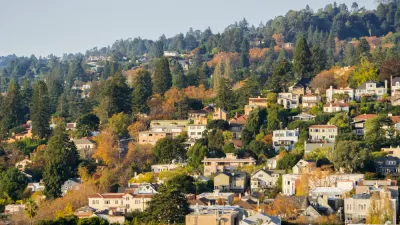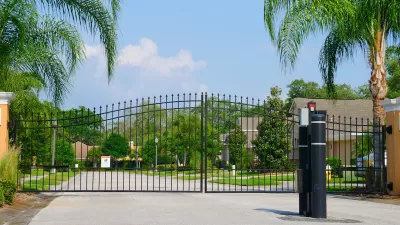Exclusionary zoning and land use tactics have a long history in the United States, retaining startling relevance in contemporary times. A deep investigation into Connecticut land use politics reveals just how entrenched these practices are.

Jacqueline Rabe Thomas explores Connecticut for lessons in how wealthy suburbs surround themselves "with invisible walls to block affordable housing and, by extension, the people who need it."
In a liberal state that has provided billions in taxpayer money to create more affordable housing, decisions at local zoning boards, the Connecticut Capitol and state agencies have thwarted court rulings and laws intended to remedy housing segregation. As far back as data has been kept, Connecticut’s low-income housing has been concentrated in poor cities and towns, an imbalance that has not budged over the last three decades.
The article starts with a single development anecdote from the city of Westport, but the article is also the vessel for sharing the findings for a larger study by the Connecticut Mirror and ProPublica that finds "more than three dozen Connecticut towns have blocked construction of any privately developed duplexes and apartments within their borders for the last two decades, often through exclusionary zoning requirements. In 18 of those towns, it’s been at least 28 years."
There is, however, a lot more relevant data and research to share, like evidence of the segregation of Connecticut neighborhoods, the long-term consequences of neighborhoods [pdf] for the social mobility of residents, and the high costs of living in neighborhoods with better schools.
A common narrative throughout all the political histories and research presented in this article: Democratic state leadership has allowed local control land use control to perpetuate sources of inequality. The Connecticut Governor Ned Lamont hasn't yet voiced support for changing the status quo.
FULL STORY: Separated by Design: How Some of America’s Richest Towns Fight Affordable Housing

Planetizen Federal Action Tracker
A weekly monitor of how Trump’s orders and actions are impacting planners and planning in America.

Maui's Vacation Rental Debate Turns Ugly
Verbal attacks, misinformation campaigns and fistfights plague a high-stakes debate to convert thousands of vacation rentals into long-term housing.

San Francisco Suspends Traffic Calming Amidst Record Deaths
Citing “a challenging fiscal landscape,” the city will cease the program on the heels of 42 traffic deaths, including 24 pedestrians.

Amtrak Rolls Out New Orleans to Alabama “Mardi Gras” Train
The new service will operate morning and evening departures between Mobile and New Orleans.

The Subversive Car-Free Guide to Trump's Great American Road Trip
Car-free ways to access Chicagoland’s best tourist attractions.

San Antonio and Austin are Fusing Into one Massive Megaregion
The region spanning the two central Texas cities is growing fast, posing challenges for local infrastructure and water supplies.
Urban Design for Planners 1: Software Tools
This six-course series explores essential urban design concepts using open source software and equips planners with the tools they need to participate fully in the urban design process.
Planning for Universal Design
Learn the tools for implementing Universal Design in planning regulations.
Heyer Gruel & Associates PA
JM Goldson LLC
Custer County Colorado
City of Camden Redevelopment Agency
City of Astoria
Transportation Research & Education Center (TREC) at Portland State University
Jefferson Parish Government
Camden Redevelopment Agency
City of Claremont





























